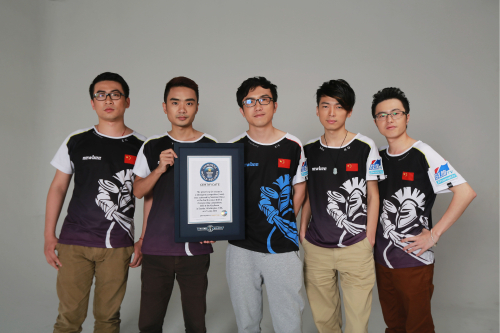|
 |
|
BIG WINNER: Newbee E-sports Club sets a Guinness World Records title for greatest prize money in a videogame competition after netting an incredible $5 million at the International DOTA2 Competition held in July in the United States (CFP) |
"Many object to us calling it a 'sport'," said Wang Boqin, Jian's teammate who is better known to fans as Tabe, the name he uses while playing. "They say we just play games, how can it be sport?"
Wang retorted by stating that "every sport comes from games, we call the biggest sport competition in the world the Olympic Games."
The main difference between computer games and e-sports, according to Wang, is e-sports are a battle of wits and reactions against other humans, rather than a program.
"It is like playing chess. Even when you play chess online, it is still chess," said Wang. "Succeeding at e-sports requires strategy, cooperation, concentration and many hours of practice. It is a very complex and nuanced sport."
As a testament to the intense speed at which these games are played, players are often rated by their average actions per minute. In Starcraft, for example, professionals routinely issue 200 to 300 commands in a single minute, which averages between four to five times a second. Korean player Park Sung Joon, a professional Starcraft player for more than 10 years, once reached a staggering average of 818 actions per minute in a match.
"These e-athletes need to practice at least eight hours a day, and these are eight high-concentration hours. It is very tiring," said Liu Jun, who organized a DOTA competition in 2011 in Dalian, China's northern Liaoning Province. "E-sports began to be played in Dalian in 2002 but there are still less than 20 professional players here, and it is difficult for our teams to rank highly in national competitions."
Liu suggested the sport be only suitable to be taken up by very young people. Before entering competitive play, an e-athlete needs years of practice and experience, with professional training having to begin before the age of 15, which is also a very important age at schools. "If they choose this, they have to quit normal school study, which is also a great pressure not only for them, but also for their parents," said Liu.
Money meets games
True game lovers make this decision without hesitation, especially since the industry is growing at a breakneck speed.
In 2011, Wang Sicong, son of Wang Jianlin, Chairman of Dalian Wanda Group, set up the Invictus Games (iG) Club and stepped into the sphere of e-sports. The salary he offered to players was several times the market average and quite a few excellent players, including some from well respected teams like Ehome and LGD, transferred to his club.
"The e-sports industry in China is in chaos," Wang posted on his micro-blogs. "Many players don't get paid properly and clubs don't know how to manage themselves. I believe that with iG, all this will change."
But the high salary he offered seemed to make things even more chaotic. "The players all of a sudden wanted higher salaries—a lot higher than normal—and they even threatened to leave if I didn't pay enough," said a club owner who declined to reveal his full name. "Many clubs can't afford to pay better than they do."
In February 2012, Association of China E-sports (ACE), was formed with hopes to balance and regulate the industry.
On March 19, 2013, the General Administration of Sport announced the forming of a 17-person national team for e-sports, which officially paved the way for development of the sport in China.
Although the players continue to enjoy increasing salaries, commentators earn even more—something else which sets e-sports aside from traditional sports.
Wei Handong, born in 1991, was a League of Legends player for the team WE in 2011, where he only earned 3,000 yuan ($490) a month. Even after he won the championship in 2012, his salary was still less than 8,000 yuan ($1,307). Before he announced his resignation in August he was offered 20,000 yuan ($3,268) a month, but now he makes an outstanding 5 million yuan ($817,000) a year as a commentator.
To earn this much, Wei does 90 hours of live commentating each month, but it is already much less intense than his time as a professional e-athlete.
"Only players can understand the games and understand how intense the training was," said Wei, explaining the need for commentators to have a background like his own.
Even so, Wei's income is nothing compared to Yang Fengzhi, better known as Xiaozhi, who can earn 15 million yuan ($2.45 million) a year as a commentator.
Wu Sheng also chose to be a commentator after he became too old to play competitively. At the same time, he opened an online shop selling e-sports accessories. Each month, the sales at his shop average about 1 million yuan ($158,730).
Zhang Xiangling, best known by her online name Xiaocang, is the most famous female e-sports commentator in China. Born in 1983, Zhang began playing e-sports in high school and in 2005, when she was a student at Beijing Normal University, she started a career as an e-sports commentator. In 2008, Zhang was selected as a torch relayer for the Beijing Olympic Games as a representative of e-sports.
| 